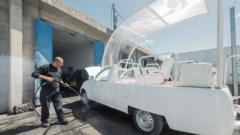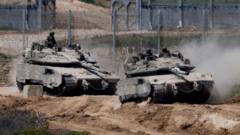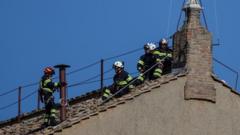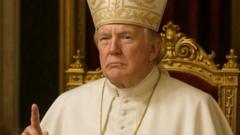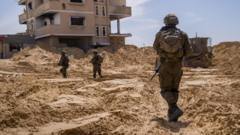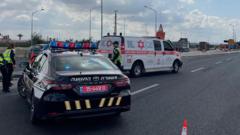Cardinal Pierbattista Pizzaballa, the Latin patriarch of Jerusalem, is being considered as a leading candidate to succeed Pope Francis. His deep connections within the interfaith landscape of the region and recent acts of bravery have positioned him as a potent symbol of the Church's global mission, even as his outsider status and relative youth raise questions among his peers.
Cardinal Pierbattista Pizzaballa: A Leading Contender for the Papacy

Cardinal Pierbattista Pizzaballa: A Leading Contender for the Papacy
As the selection process for a new pope approaches, Cardinal Pierbattista Pizzaballa emerges as a significant candidate, bringing extensive experience from Jerusalem amid ongoing regional turmoil.
Cardinal Pierbattista Pizzaballa, who currently serves as the Latin patriarch of Jerusalem, is garnering attention as a potential successor to Pope Francis. Held in high regard for his commitment to interfaith dialogue, his long-term presence in Jerusalem—a region of great significance for Judaism, Christianity, and Islam—has equipped him with a unique perspective on the ongoing religious and political challenges these faiths face.
Pizzaballa captured headlines recently when he volunteered to act as a hostage to negotiate the release of kidnapped Israeli children following the Hamas attack on Israel on October 7, 2023. While his offer was not accepted, it highlighted his dedication to peace and reconciliation. His experience in politically volatile circumstances appears to enhance his candidacy, particularly given the Catholic Church's mission to promote unity and understanding among diverse communities.
As an Italian, Pizzaballa’s election could signify a departure from the nearly 50-year trend of non-Italian popes, shifting the balance back to Italy. This potential change raises questions among some members of the Church hierarchy, many of whom worry about Pizzaballa's age, at 60, and what this means for the longevity of his papacy. Precedents set by the late Pope John Paul II, who was also elected at a relatively young age but went on to serve for 26 years, fuel these concerns.
Though Pizzaballa is appreciated for his conservative alignment with traditional church practices, his time in the Middle East has rendered him somewhat of an enigma. The uncertainties surrounding his stance on various contentious issues within the Church could play a critical role in the upcoming conclave, as Church members weigh the benefits of having a leader deeply entrenched in the global religious landscape against the risks of an outsider who may not align perfectly with the Vatican's established norms. As the conclave approaches, Pizzaballa's candidacy embodies the complex interplay between tradition, regional experience, and the evolving demands of the Church in the 21st century.


